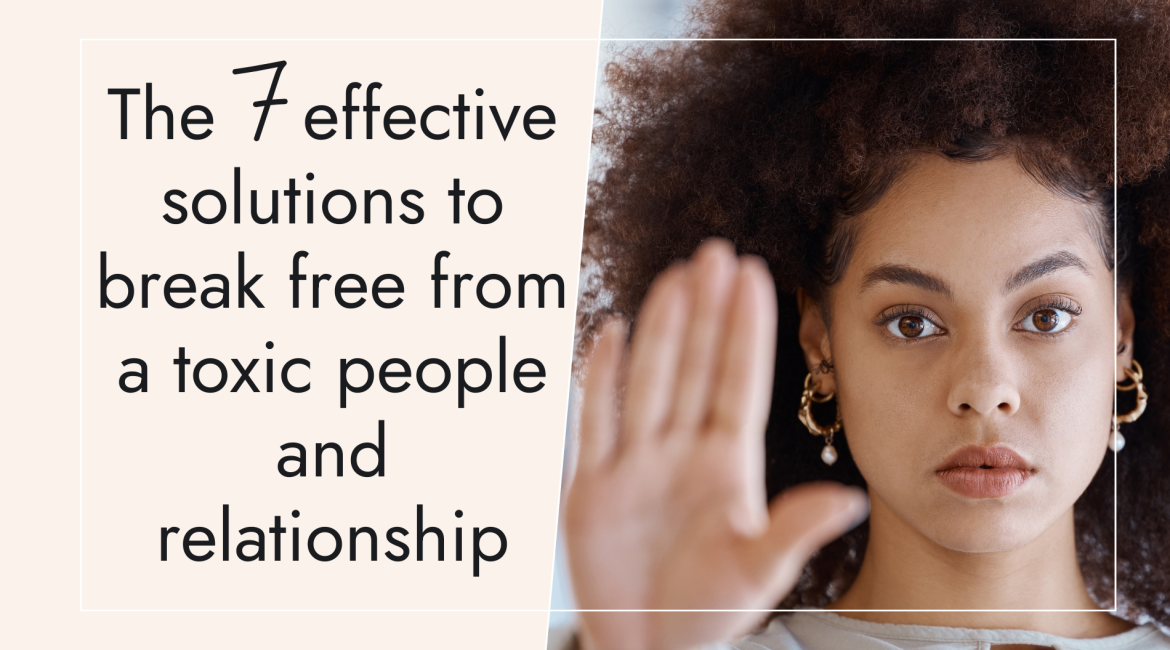Freeing Your Life from Toxic Individuals: Breaking the Chains for Personal Growth
Understanding the Dynamics of Toxic Relationships and Thriving Beyond Destructive Bonds
Have you ever been in a relationship with someone who seems to drain your energy and dampen your happiness? Toxic relationships can be extremely detrimental, impacting your well-being and personal development. In this article, we will explore the effects of being in a relationship with a toxic person, understand how it can affect your life, and discover practical ways to break free. Get ready to break the chains that bind you and fully thrive in your journey of personal growth.
A toxic person is someone who has a negative impact on our emotional, mental, and sometimes physical well-being. Their behavior and attitude can be destructive, leading to detrimental consequences for our mental health and relationships.
Unraveling the Mechanisms of a Destructive Relationship:
Have you ever noticed recurring patterns in your relationships where you feel diminished, manipulated, or exploited? Toxic individuals have a devastating impact on our emotional well-being and self-esteem. Here are some examples of toxic behaviors:
Emotional Manipulation: Toxic individuals often employ manipulation tactics to control others and get what they want. They may make you feel guilty, criticize you, or withhold affection to keep you under their influence. Constant Criticism: Toxic individuals are quick to criticize and belittle others. They undermine your self-confidence and fuel your doubts, creating a toxic environment. Perpetual Negativity: Toxic individuals tend to view the world through a negative lens and spread their pessimism. Their toxic energy can influence you, leaving you drained and lacking motivation.
The impact of toxic individuals on your life is profound. They can undermine your self-confidence, disrupt your relationships, and hinder your personal growth. For example, imagine a woman who is in a toxic friendship with someone who is constantly critical. This friend belittles and undermines her achievements, creating feelings of inadequacy and anxiety.
Here are some types of toxic people you may encounter:
The Manipulator: This person is skilled at influencing and controlling others. They often use manipulation tactics to get what they want, without caring about the consequences for others.
Mode of Operation: They employ manipulation tactics such as gaslighting, guilt-tripping, or playing mind games to control others and get their way.
Example: A manipulator might make you feel guilty for not doing what they want by using emotional blackmail or twisting the truth.
The Constant Critic: This person is always ready to criticize and belittle others. They tend to constantly find faults in others and highlight them to feel superior.
Mode of Operation: They continuously find fault and criticize others, often to boost their own ego or exert power over them.
Example: A constant critic might nitpick and belittle your appearance, abilities, or life choices, leaving you feeling inadequate.
The Self-Centered: This person has a self-centered worldview. They primarily focus on their own needs and desires, without caring about others. They can be insensitive to the feelings and needs of others.
Mode of Operation: They are primarily concerned with their own needs and desires, showing little empathy or consideration for others.
Example: A self-centered person may consistently monopolize conversations, dismiss others’ feelings, or take credit for collective achievements.
The Emotional Manipulator: This person uses others’ emotions to control them. They may play with your feelings, make you feel guilty, or exploit your emotional vulnerabilities to achieve their goals.
Mode of Operation: They exploit others’ emotions to control and manipulate their actions or gain sympathy.
Example: An emotional manipulator might use guilt, fear, or emotional outbursts to manipulate your decisions or keep you under their control.
The Saboteur: This person tends to sabotage your efforts and successes. They may express envy, jealousy, or deliberately undermine you to prevent you from succeeding or thriving.
Mode of Operation: They undermine the efforts and successes of others out of jealousy, envy, or a need for superiority.
Example: A saboteur may spread rumors, sabotage projects, or downplay your achievements to hinder your progress or self-confidence.
The Drama Queen/King: This person constantly creates drama and conflicts. They enjoy being the center of attention and use conflict-ridden situations to elicit sympathy and support.
Mode of Operation: They thrive on creating drama and conflicts to gain attention, sympathy, or control over others.
Example: A drama queen/king may exaggerate situations, play the victim, or manipulate others’ emotions to remain at the center of attention.
The Narcissistic Perfectionist: This type of toxic person exhibits narcissistic traits and sadism. They seek to exert power and control over others, using more subtle and unhealthy manipulation tactics.
Mode of Operation: They combine narcissistic traits with a sadistic tendency, seeking power, control, and perfection at the expense of others’ well-being.
Example: A narcissistic perfectionist may demean and humiliate others, set impossible standards, and derive pleasure from causing emotional harm.

Breaking Free from Toxic Individuals. Steps to Liberation:
Are you determined to free yourself from the grip of a toxic relationship and regain control over your life? Here are key steps to help you detach from toxic individuals and rebuild yourself:
- Recognize the signs: Become aware of toxic behaviors and destructive patterns present in the relationship. Be honest with yourself and identify the issues. Solution: Become aware of toxic behaviors and patterns in the relationship. For example, if your partner constantly belittles your achievements or tries to control your every move, it’s a sign of toxicity.
- Set clear boundaries: Define your boundaries and express them clearly to the toxic person. Ensure that these boundaries are respected and do not allow yourself to be manipulated into crossing them. Solution: Define and communicate your boundaries to the toxic person. For instance, if your friend constantly asks you for favors that drain your energy, let them know that you can no longer accommodate those requests.
- Seek social support: Reach out to supportive and positive individuals in your life. Talk to friends, family members, or a competent professional for guidance and support during this challenging time. Solution: Reach out to supportive individuals in your life. For example, confide in a close friend or family member who can provide guidance and emotional support during this challenging time.
- Focus on self-care: Prioritize your personal well-being and personal growth. Take care of your physical and mental health, engage in activities that bring you joy, and strengthen your self-esteem. Solution: Prioritize your well-being and personal growth. Engage in activities that bring you joy and promote self-care, suchsuch as practicing mindfulness, engaging in hobbies, or seeking therapy or counseling.
- Develop an exit plan: Prepare to end the toxic relationship by developing a concrete plan. Identify the necessary steps to distance yourself, whether physically or emotionally, by surrounding yourself with appropriate resources and support. Solution: Prepare yourself to end the toxic relationship. For instance, if you’re in an emotionally abusive relationship, seek legal advice, gather evidence, and plan a safe exit strategy.
- Learn to say “no”: Practice assertiveness by saying “no” when necessary. Do not feel obligated to accept or respond to unreasonable or abusive demands from the toxic person. Solution: Practice assertiveness and set boundaries. For example, if your co-worker constantly asks you to cover their workload, kindly decline and explain that you have your own responsibilities to attend to.
- Seek professional help: If the toxic relationship is particularly difficult to overcome, consider seeking therapy or counseling from professionals specializing in toxic relationships. They can provide additional support, strategies, and tools to help you detach in a healthy way and rebuild your life. Solution: Consider seeking therapy or counseling from professionals experienced in dealing with toxic relationships. They can provide guidance, support, and tools to help you navigate the challenges of breaking free.
Ladies, toxic individuals can poison our lives and hinder our personal growth. However, by recognizing destructive patterns, setting healthy boundaries, and strengthening our self-esteem, we can break free from their grip. Remember that you deserve positive and nurturing relationships. By detaching from toxic individuals, you open the path to a more fulfilling and authentic life. You have the power to rebuild your life and continue on your path of personal growth. No longer let toxic individuals dictate your happiness. Choose your own path to healing and thriving.






Leave a reply
You must be logged in to post a comment.